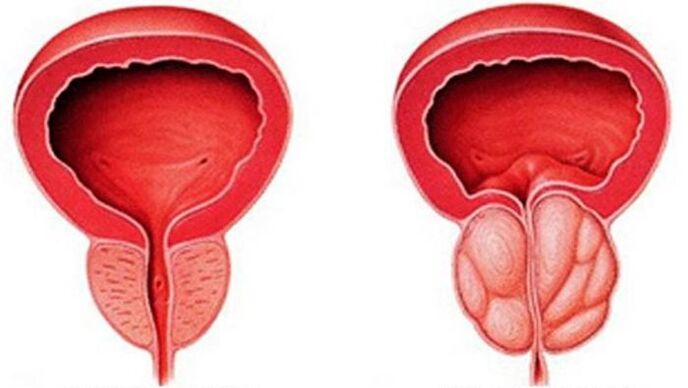Acute prostatitis is the most common disease in men. Almost 60% of the male population is most commonly diagnosed between the ages of 30 and 50.
In the acute form of prostatitis, an inflammatory process occurs in the prostate. For the treatment of this stage of the disease, several groups of drugs are used, prostate massage, physiotherapy. The most important thing in treatment is to prevent the pathology from turning into a chronic form.
Male acute prostatitis and its developmental causes
Acute prostatitis is the development of an inflammatory process in the prostate caused by the penetration of infection.
The disease is accompanied by swelling and suppuration of prostate tissue.
It is the most common disorder in men and is associated with impairment of sexual function and fertility, psycho-emotional state disorders, and social maladjustment.

forms of acute prostatitis
The development of acute prostatitis goes through 4 stages, which are simultaneously its forms:
- catarrhality;
- follicles;
- substance;
- abscess.
The disease begins with the development of catarrhal inflammation, which leads to changes in the mucus and submucosa of the glandular excretory ducts. Edema of the duct wall causes stasis of mucopurulent secretions in the prostate follicles. The inflammatory process begins to progress, resulting in localized suppuration of the prostatic lobules. The formation of acute follicular prostatitis.
Multiple damage to the glandular lobules, structural changes in the prostate tissue and the development of purulent inflammatory processes in it lead to the next stage of the disease - the parenchyma.
Prostate abscesses form when many inflammatory lesions coalesce into one large lesion. It is possible to open it into the urethra, perineum, rectum, or bladder cavity.
Cause of disease development
The following factors can cause acute prostatitis in men:
- Infectious processes of the genitourinary system. Infectious pathogens (Gram-negative and Gram-positive) can infiltrate prostate tissue: Escherichia coli, Proteus, Staphylococcus, Streptococcus. In many cases, the acute form of the disease may be caused by pathogens of genitourinary infections, such as: uremia, chlamydia, mycoplasma, gonorrhea, candidiasis, etc.
- The process of infection through the urethra into the urethra. Microorganisms can enter the prostate tissue through the prostatic excretory duct leading to the urethra. This is why any type of bladder inflammation can accompany acute prostatitis in men.
- The process of infection that enters the glands through the blood. Infections enter the prostate through the blood supply system due to its widely developed arteriovenous fusion system. In this case, microorganisms are carried through the circulatory system from distant foci of suppurative inflammation, such as: tonsillitis, dental caries, sinusitis, bronchitis, cholecystitis, etc.
- A sedentary lifestyle. Due to low motor activity, a stagnation of prostatic fluid is formed. This is due to: working in front of a computer for a long time, rarely walking in fresh air, smoking and drinking, rarely having sex, and refusing to take active breaks.
- low temperature. Prolonged exposure to cold in the genitourinary system can lead to disturbances in the blood supply, which can also lead to stagnation of the prostate, leading to acute prostatitis.
- Pelvic organ and prostate injury. When injured, the secretions of the prostate gland are difficult to release, which leads to the development of an inflammatory process, which in turn leads to acute prostatitis.
- medical procedure. Acute prostatitis may develop as a result of chemotherapy or radiation therapy and medical tests through the urethra.
symptom
The clinical presentation of acute prostatitis is characterized by the presence of the following signs:
- difficulty urinating
- A feeling of incomplete emptying of the bladder;
- the occurrence of frequent urination;
- itching and burning;
- Dull pain in the head of the penis, radiating to the anus (with the development of the pathology, the pain will become chronic);
- pain during bowel movements;
- increased body temperature (from 37 to 40 degrees - depending on the stage of disease development);
- decreased libido;
- erection problems;
- The amount of pus and blood in the urine;
- General well-being deteriorated.
treat
In contrast to chronic forms of the disease, acute prostatitis responds well to treatment. Serious complications are very rare.
The most important task of drug therapy is to free the patient from the causative agent of pain syndromes and pathologies and to restore the normal course of urination.
Medications used to treat acute prostatitis:
- The main drug group of antibiotics for the treatment of acute prostatitis. To choose antibiotics, doctors must accurately identify the causative agent of the disease. Most often, when one drug is taken in a course, a combination of antibiotics is prescribed and then replaced by another. This approach can minimize the development of re-inflammation and prevent the acute form of the disease from turning into a chronic disease. Antibiotics - fluoroquinolones, tetracyclines, penicillins have been used successfully.
- Diuretics Diuretics are used to facilitate the urination process and reduce stress. Diuretics promote regular and large urine output. Use medications and herbal diuretics.
- Antipyretics. They are used to lower body temperature and eliminate pain in joints and head.
- Antispasmodic. Medications that relax smooth muscles and relieve spasms. Additionally, the medications in this group relieve pain and help ease urination.
- Alpha blockers. Medications that work well to relieve spasms, irritation, and promote the passage of urine from patients.
After the elimination of the main symptoms of the disease, prostate massage and physiotherapy procedures can be prescribed additionally.
After recovery, you must lead a healthy lifestyle.
Correct choice of treatment and compliance with all doctor's prescriptions will eliminate acute prostatitis and prevent it from becoming chronic.






























